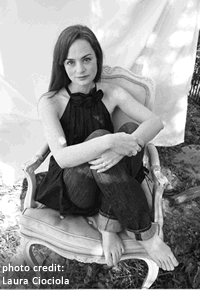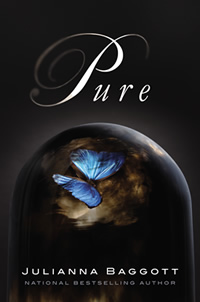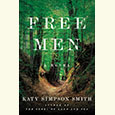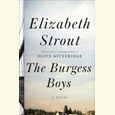Living in Dangerous Times
In Julianna Baggott’s post-apocalyptic novel, Pure, children struggle to save a world destroyed by adults
“There was low droning overhead a week or so after the Detonations; time was hard to track … The droning was some kind of air mission, and we wondered if there would be more bombs. But what would be the point? Everything was gone, obliterated or swept up by the fires; there were dark puddles from black rain. Some drank the water and died from it. Our scars were fresh, our wounds and warpings raw. The survivors hobbled and limped, a procession of death, hoping to find a place that had been spared.” So begins Pure, a beautiful, startlingly inventive, dystopian novel by the prolific author Julianna Baggott.
A futuristic blend of fairy tale and science fiction reminiscent of George Orwell’s classic 1984, Pure is a departure for Baggott, but she’s no stranger to crossing genres. Counting titles written under the pen names Bridget Asher and N.E. Bode, she’s published seventeen books, including fiction for adults and younger readers, as well as poetry. Pure, the first in a planned trilogy, has been optioned by Fox 2000 and the lead producer of the Twilight movies, and within a few chapters it’s easy to see why. The cinematic setting vividly described in the book’s opening is a post-apocalyptic world charred by detonations. Survivors are divided into two camps: the so-called “Pures,” who have been cherry-picked to live safely within the Dome, a bubble immune to future attacks and disasters, and those left to fend for themselves on the outside.
 Pressia, the book’s teenaged narrator, lives outside the Dome, where everything reeks of chaos and imminent doom. An orphan, she and her grandfather live in a barbershop wrecked by the Detonations that hit a decade earlier, killing her Japanese mother. The bombs wreaked havoc on those who survived in bizarre and painful ways: any object a person was holding during the explosions has been fused to his or her body; Pressia’s right hand has been permanently shaped to form the doll she carried. A man’s leg has been transformed into a maimed dog, and another has birds attached to his back. The babies born after the Detonations “are mutated, born with traces of their parents’ deformities,” Baggott writes. “Animals too. Instead of starting anew, the breeds only seem to get more convoluted, a mix of human, animal, earth, objects.” The intensity deepens almost page by page.
Pressia, the book’s teenaged narrator, lives outside the Dome, where everything reeks of chaos and imminent doom. An orphan, she and her grandfather live in a barbershop wrecked by the Detonations that hit a decade earlier, killing her Japanese mother. The bombs wreaked havoc on those who survived in bizarre and painful ways: any object a person was holding during the explosions has been fused to his or her body; Pressia’s right hand has been permanently shaped to form the doll she carried. A man’s leg has been transformed into a maimed dog, and another has birds attached to his back. The babies born after the Detonations “are mutated, born with traces of their parents’ deformities,” Baggott writes. “Animals too. Instead of starting anew, the breeds only seem to get more convoluted, a mix of human, animal, earth, objects.” The intensity deepens almost page by page.
Within days, Pressia will turn sixteen, the age at which children are required to turn themselves over to the OSR, a brutish military force. There, the teenagers will either be trained as soldiers or, if they’re too weak and damaged for service, used for target practice. Pressia’s grandfather has built a place for her to hide when they come for her, a cabinet through which he hopes she will escape. The difficulty lies in knowing where she can go.
 Meanwhile, inside the Dome, one of the Pures, a boy named Partridge, is plotting his own escape. His motivations differ from Pressia’s, and his surroundings are a stark contrast to hers. Pampered and perfect, the bodies of the young Pures are regularly subjected to a battery of “codings” designed to increase their physical strength and quell any latent rebellious tendencies. Partridge’s father is highly ranked within the Dome, which affords Partridge special treatment, but the two have a tenuous relationship at best. He mourns the death of his brother and, though he’s been told his mother died, Partridge suspects she’s alive outside the Dome. Partridge is desperate to find her, if she is indeed still living, and to save himself from being subjected to further reprogramming. To do both, he must escape the Dome, and to survive in the outside, he will need help.
Meanwhile, inside the Dome, one of the Pures, a boy named Partridge, is plotting his own escape. His motivations differ from Pressia’s, and his surroundings are a stark contrast to hers. Pampered and perfect, the bodies of the young Pures are regularly subjected to a battery of “codings” designed to increase their physical strength and quell any latent rebellious tendencies. Partridge’s father is highly ranked within the Dome, which affords Partridge special treatment, but the two have a tenuous relationship at best. He mourns the death of his brother and, though he’s been told his mother died, Partridge suspects she’s alive outside the Dome. Partridge is desperate to find her, if she is indeed still living, and to save himself from being subjected to further reprogramming. To do both, he must escape the Dome, and to survive in the outside, he will need help.
It’s unclear why, exactly, the apocalypse occurred. There are no apparent political implications. A small group of men, Partridge’s father among them, may have been behind the construction of the Dome and the destruction of the world outside, with the goal of forming a superior line of humans. As these adults scheme to ruin and kill, the kids scramble to survive. And against overwhelming odds they do. Despite Pure’s dark themes and violence, the book is full of life and verve, fueled by Baggott’s vivid prose. In Pressia, readers find a protagonist worth rooting for. A line from Adrienne Rich’s Diving Into the Wreck perfectly captures this brave, honorable heroine: “Her wounds came from the same source as her power.”
Julianna Baggott will discuss Pure at the twenty-fourth annual Southern Festival of Books, held October 12-14 at Legislative Plaza in Nashville. All events are free and open to the public.


